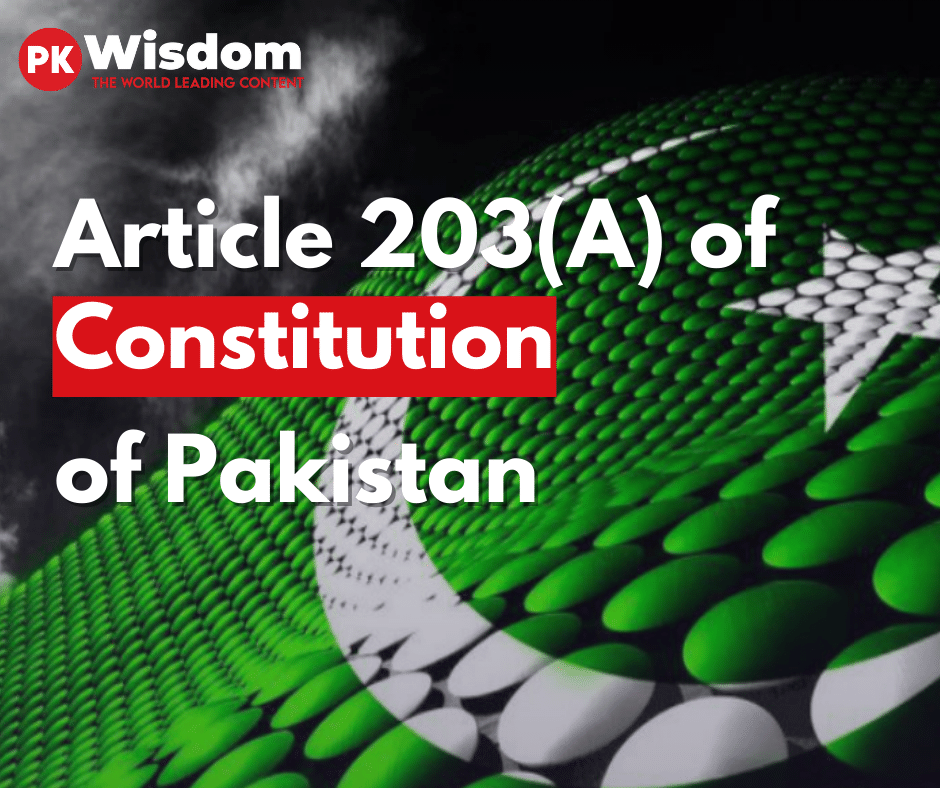Table of Contents
Overview of Article 203A of the Constitution of Pakistan
Nestled within the intricate framework of the Constitution of Pakistan 1973, Article 203A stands as a beacon of legal supremacy, asserting its authority over conflicting provisions within the constitutional text. This exploration delves into the essence of Article 203A, unraveling its significance, the overarching principles it embodies, and the distinctive role it plays within the constitutional architecture.
Article 203A States
203A. Provisions of Chapter to override other Provisions of Constitution
The provisions or this Chapter shall have effect notwithstanding anything contained in the Constitution.
Key Points of Article 203A of the Constitution of Pakistan
- Supremacy of Chapter Provisions: The primary thrust of Article 203A lies in establishing the supremacy of the provisions within the designated chapter. Regardless of the content of other constitutional provisions, the principles enshrined in this specific chapter take precedence.
- Override Principle: Article 203A embodies an override principle, indicating that the matters addressed in the designated chapter are intended to prevail over any conflicting provisions found elsewhere in the Constitution. This principle underscores the exceptional nature and importance of the issues covered within this specific section of the Constitution.
- Contextual Interpretation: To fully comprehend the implications of Article 203A, a careful examination of the content of the chapter it refers to is necessary. The overriding effect is contextual, and a nuanced understanding requires considering the specific legal, political, or administrative matters addressed within that chapter.
Download the Constitution of Pakistan in PDF
Crux of Article 203A of the Constitution of Pakistan
At its core, Article 203A embodies a principle of legal hierarchy, asserting that the provisions within the designated chapter hold superior authority. The crux of this provision lies in recognizing the exceptional significance and unique standing of the matters addressed within that specific section of the Constitution. It serves as a constitutional tool, signaling that, in specific contexts, certain principles or rules deserve special consideration and take precedence over conflicting provisions elsewhere.
The crux of Article 203A can only be fully appreciated through an in-depth analysis of the content, context, and historical evolution of the chapter it references. It encapsulates a mechanism for tailored legal treatment, acknowledging that certain issues may require exceptional measures, even if they diverge from the general constitutional framework.
Conclusion: Article 203A of the Constitution of Pakistan
In conclusion, Article 203A of the Constitution of Pakistan exemplifies a unique legal mechanism designed to underscore the supremacy of specific provisions within a designated chapter. It introduces an override principle, emphasizing the exceptional nature of the matters covered and the need for distinct consideration within the constitutional framework.
This provision, while concise, carries significant weight, serving as a testament to the flexibility and adaptability of the constitutional system. Article 203A, within the broader context of the 1973 Constitution, exemplifies the commitment to a legal framework that can tailor its approach to specific circumstances, ensuring that certain issues receive the necessary attention and precedence within the constitutional hierarchy.


